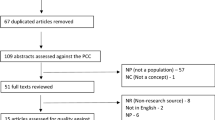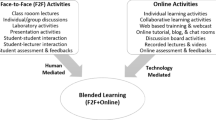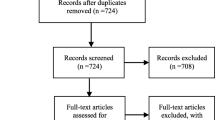Abstract
Ensuring quality in healthcare today has become extremely essential to ensure adequate utilization of healthcare services and improved outcomes. In addition to essential infrastructure in terms of safe and adequate space, knowledgeable and skilled health workers, and essential equipment and supply, the healthcare teams and administrators must also acquire knowledge and skills related to quality improvement (QI) methodologies. This review describes the role of learning platforms in teaching QI skills to the busy healthcare teams. Through Review of the published literature, we discuss challenges of learning and applying new skills of QI in day-to-day work by healthcare teams, and how learning platforms can assist in capacity building. There is a significant body of literature on the role of web-based teaching technology and learning platforms in medical education. Using modern communication technology, learning platforms can be established to bring together the healthcare teams, with QI experts to collaboratively learn, execute and share their experiences in improving quality of care in their own healthcare settings.
Similar content being viewed by others
References
Director-General Dr Tedros takes the helm of WHO: address to WHO staff (2017,July 3). Available from: https://doi.org/www.who.int/dg/speeches/2017/taking-helm-who/en. Accessed May 1, 2018.
Healthier WHO South-East Asia Region; Responsive Regional Office. Available from: https://doi.org/www.searo.who.int/mediacentre/features/2014/rd-singh-vision/en//. Accessed May 1, 2018.
Let’s make our health system healthier. (n.d) Quality Improvement. Available from: https://doi.org/www.hqontario.ca/quality-improvement. Accessed May 1, 2018.
Sheingold BH, Joyce AH. The history of healthcare quality: The first 100 years 1860–1960. Int J Africa Nur Sci. 2014;1:18–22.
Sheingold BH, Joyce AH. The history of healthcare quality: The first 100 years 1860–1960. Int J Africa Nurs Sci. 2014;1:18–22.
Luce JM, Bindman A, Lee PR. A brief history of health care quality assessment and improvement in the United States. West J Med. 1994;160:263–8.
Spreading Quality Improvement, cited 2017, March 28. Available from: https://doi.org/www.rwjf.org/en/library/research/2011/12/spreading-quality-improvement-.html. Accessed May 2, 2018.
Dobrow MJ, Neeson J, Sullivan T. Canadian chief executives’ prescription for higher quality: more clinical engagement, shared accountability and capacity development. Healthc Q. 2011;14:18–21.
Sinclair P, Kable A, Levett-Jones T. The effectiveness of internet-based e-learning on clinician behavior and patient outcomes: a systematic review protocol. JBI Database of Systematic Reviews and Implementation Reports. 2015;13:52–64.
Plourde M. What is a learning Platform? Available from: https://doi.org/mfeldstein.com/what-is-a-learning-platform/. Accessed May 2, 2018.
Timeless Learning Technologies. Available from: https://doi.org/www.timelesslearntech.com/learning-platform.php. Accessed May 2, 2018.
SCORM. (2015, October 23). Available from https://doi.org/www.adlnet.gov/scorm. Accessed May 02, 2018.
IMS Global Learning Consortium. Available from: https://doi.org/www.imsproject.org. Accessed May 02, 2018.
Open Knowledge Initiative. Available from: https://doi.org/web.mit.edu/oki/. Accessed May 02, 2018.
Dhir SK, Verma D, Batta M, Mishra D. E-learning in medical education in India. Indian Pediatr. 2017;54:871–7.
Taveira-Gomes T, Ferreira P, Taveira-Gomes I, Severo M, Ferreira MA. What are we looking for in computer-based learning interventions in medical education? A systematic review. J Med Int Res. 2016;18:e204.
McLaren, C. HA comparison of student persistence and performance in online and classroom business statistics experiences. Decision Sciences J Innovative Education. 2004;2:1–9.
Stewart A, Garry I, Jardine L, Pieter K, Davies William M. A randomised controlled trial of blended learning to improve the newborn examination skills of medical students. Arch Dis Child-Fetal Neonatal Ed. 2013;98:F141–4.
McHugh SM, Corrigan M, Dimitrov B, Cowman S, Tierney S, Humphreys H, et al. A targeted e-learning program for surgical trainees to enhance patient safety in preventing surgical infection. J Conti Edu Health Profess. 2010;30: 257–9.
Marshall NL, Spooner FM, Galvin PL, Ti JP, Gerald McElvaney FN, Lee MJ. Evaluation of an e-learning platform for teaching medical students competency in ordering radiologic examinations. Radiographics. 2011;31:1463–74.
Woods CR, Kemper KJ. Curriculum resource use and relationships with educational outcomes in an online curriculum. Acad Med. 2009;84:1250–8.
Kolb S, Reichert J, Hege I, Praml G, Bellido MC, Martinez-Jaretta B, et al. The NetWoRM group. Int Arch Occup Environ Health. 2007;80:553–7.
Institute for Healthcare Improvement. Available from: https://doi.org/www.ihi.org/education/Pages/default.aspx. Accessed May 2, 2018.
ISQua Fellowship Programme. Available from: https://doi.org/www.isqua.org/education/the-isqua-fellowship. Accessed May 2, 2018.
World Health Organisation, Improving the Quality of care for Mothers and Newborns in Health Facilities (2018, January 09). Available from: https://doi.org/www.searo.who.int/entity/child_adolescent/topics/child_health/facilitators-manual/en/. Accessed May 02, 2018.
Point of care Quality Improvement. Available from: https://doi.org/www.pocqi.org. Accessed May 2, 2018.
Author information
Authors and Affiliations
Corresponding author
Rights and permissions
About this article
Cite this article
Mehta, R., Sharma, K.A. Use of Learning Platforms for Quality Improvement. Indian Pediatr 55, 803–808 (2018). https://doi.org/10.1007/s13312-018-1385-2
Published:
Issue Date:
DOI: https://doi.org/10.1007/s13312-018-1385-2




